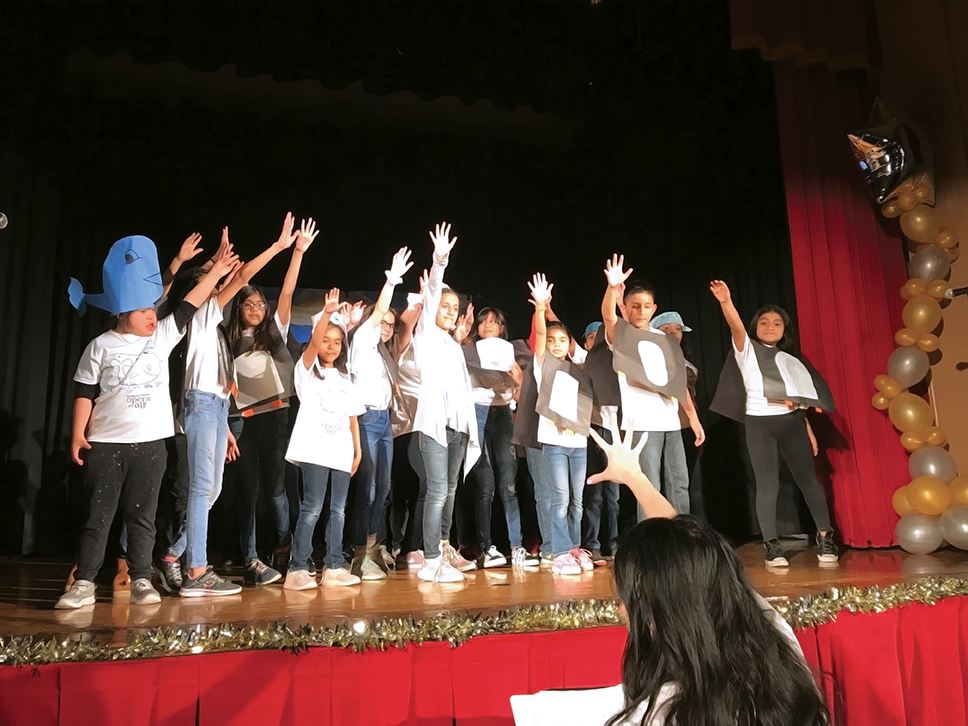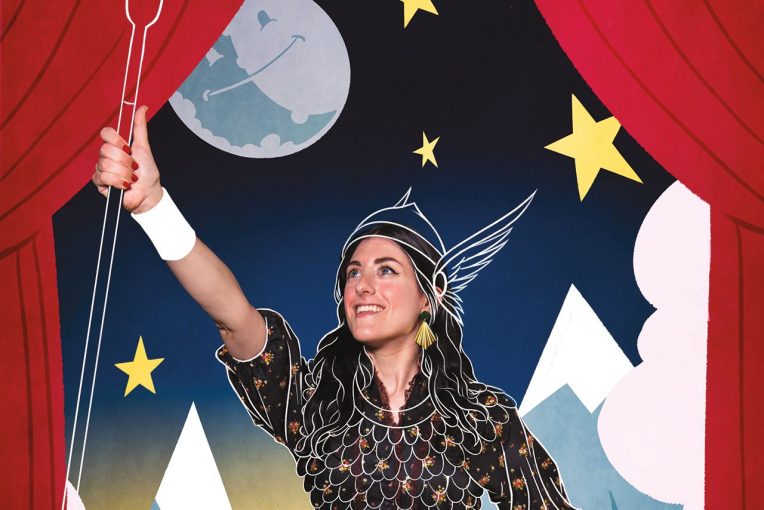Oh the drama. A roomful of second graders are writing their own opera and are stuck on a script about alien cows. What do you do?
You call that a win, said Veronica Chamberlain ’14, who absolutely loves her job working with Chicago Public Schools (CPS) students as they figure out what an opera is and then create one. Their creative effort involves composing an original song and then digging through their closets for costumes.
This isn’t about recreating classics like Carmen or La Traviata. Their operas don’t revolve around toxic relationships, frail heroines, and death duels—at least not yet. One class instead created a story about a blue-haired tarantula that leads a boy into another universe.
Appears In“When people think of opera, they think of the lady in the horn hat singing really loudly. It’s so much more than that,” said Chamberlain, who is education manager and teaching artist for the Chicago Opera Theater (COT).
The job takes her to CPS classrooms to teach second graders through high school freshmen about opera. On the first day, she asks the students how they would describe opera. “Women singing loudly” always comes back. She then explains that it is a form of storytelling not unlike musicals. It can feature rock, folk, or rap music.
“The whole idea is that opera is a living art form,” said Chamberlain, who majored in music education. “You think opera is this old dead thing. It’s not a thing that was, it’s a thing that is. It’s still living, breathing, and changing.”
Chamberlain thought she’d teach high school choir following graduation, and she did for a couple of years. She then heard about COT, a grassroots opera company started in 1973 that has a national presence and is known for performing lesser-known operas.
Hired as a teaching artist in 2017, she visited schools to talk about what it’s like to be a vocal performer. Now she’s head of Opera for All, a free arts program that takes students through a year-long process of creating their own mini masterpieces. In the 2020-2021 school year, she worked with nearly 500 students in 18 classrooms all via Zoom. The students ended the year performing their operas, 10 to 20 minutes in length, to online audiences.
“This year has been bonkers. It’s been a lesson in flexibility. Our operas aren’t going to look like they have in past years, but that’s OK,” she said. “I pretty much produced 18 operas simultaneously, which sounds crazy, but I can’t complain because my job is inherently fun.”

Pre-pandemic, teaching artists visited classrooms to give lessons on how to create, produce, and perform an opera. The effort involved composing a song, acting, choreography, and prop design. Auditions and rehearsals are run by the students.
Besides increasing each student’s understanding of opera, another goal is to get them to a live COT performance. Past performances included Moby-Dick and Freedom Ride, which focused on the Civil Rights Movement. One class is selected annually to perform part of their opera on a professional stage in a Chicago theater.
“It’s super influential to them, feeling those stage lights on their face, overcoming their nervousness on stage,” Chamberlain said. “Whether they’re the type of kid who’s a ham and loves to perform or is more quiet and loves art, they all get to contribute and see their work. Maybe they contributed a word or a costume or performed. Every student has something to show and be proud of.”
Teachers tell her that the students who excel in the COT program and love the experience are often not the ones who are best in math or stay focused in science. They instead shine uniquely in the creative effort fueled by imagination.
“All of the ideas come from the kids’ brains. It’s very real and exciting because it’s stories they make up. The kids feel valued because we’re using their ideas. They’re leading the way,” Chamberlain said.
When COT surveyed their partner teachers, 100 percent said students became more confident performing in front of an audience. The experience overall opens students’ eyes to possibilities as they look to their future.
“They love movement and dancing, which gives them more chances to be successful,” she said. “Not everyone’s going to leave opera class and say, ‘Now I want to be an opera singer,’ but maybe they’ll say, ‘I didn’t know someone designs the lights. Now I know that’s a job.’”
“I feel so strangely equipped
to do this job.”
Although she never thought she’d be teaching elementary students, Chamberlain added a language arts endorsement at ISU. That turned out to be a bonus given she’s now working with grade-schoolers as they write scripts.
Other experiences at ISU also prepared her for a career she didn’t know existed. “When I heard about this program, I was like, ‘Get me in there. This is my jam,’” she said, laughing. “I feel so strangely equipped to do this job.”
Chamberlain studied voice with Associate Professor John Koch in the Wonsook Kim College of Fine Arts. He and his spouse, Tracy Koch ’01, cofounded the Midwest Institute of Opera (MIOpera), where he’s artistic director and resident conductor. The endeavor is a partnership with ISU that brings students and community members together to perform main-stage operas and prepare artists for music performance careers.
Tracy Koch was Chamberlain’s childhood piano teacher. She also gave her voice lessons. It wasn’t long before Chamberlain fell in love with arias. “She’s the reason I even knew what opera was,” Chamberlain said. “Opera wasn’t a nebulous hoity-toity thing to me. I knew an opera singer. She was my piano teacher.”
The Kochs also gave Chamberlain her first leadership experience in opera, as she was chosen to be chorus master for MIOpera’s productions of Verdi’s Aida. She also served as children’s chorus master for Bizet’s Carmen.
“It was really because of that I dipped my toes into the opera world,” said Chamberlain, who also credits Professor Emeritus Dr. Kim McCord for the preparation she received at ISU. McCord took her music education students to Chicago schools.
“I got to teach in a CPS classroom before I even student taught,” Chamberlain said. “I don’t think I would have felt as competent going into CPS had I not done that clinical.”
When she’s not teaching, Chamberlain performs in two Chicago choirs—the Wicker Park Choral Singers and Common Pulse, which is a semi-professional choral ensemble. She also volunteers as director of the Crescendo Seniors chorus, a partnership with a senior center and the Metropolis School of Performing Arts in Arlington Heights.
And of course she sings in the Chicago apartment she shares with her spouse, Lucas Chamberlain ’14, whom she married in 2019. He is a Ph.D. candidate studying botany and sustainable agriculture at the University of Wisconsin-Madison.
While he researches fungus, Chamberlain remains happily immersed in music. If she had to name her all-time favorite opera, it would be the classic Carmen, but she also enjoys modern opera. Regardless of the style, she is intrigued because the story unfolds differently in each production.
Her own story, along with those of her students, is still being written.


